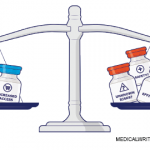(Reuters)—The U.S. Food and Drug Administration on Tuesday approved Inflectra, a cheaper version of Johnson & Johnson’s drug Remicade (infliximab), to treat Crohn’s disease, ulcerative colitis, rheumatoid arthritis, psoriasis and arthritis of the spine.
Inflectra, also known as infliximab-dyyb, is expected by some analysts to sell for a 25% discount to Remicade, which generated annual worldwide sales of $6.5 billion. Of that, $4.5 billion were in the U.S. Merck & Co. sells Remicade in Europe. Celltrion sells the biosimilar overseas under the brand Remsima.
Remicade, as well as similar drugs made by AbbVie Inc. and Amgen Inc., work by blocking an inflammation-causing protein called tumor necrosis factor. Dozens of anti-TNF biosimilars are in development.
Inflectra, made by Celltrion Inc. and Pfizer Inc.’s Hospira unit, is the second biosimilar approved by the FDA. A year ago, the agency approved Novartis AG’s Zarxio, which is similar to Amgen Inc’s white blood cell-boosting drug, Neupogen (filgrastim).
Remicade and Neupogen are biologic drugs made from living organisms. Copies of biologic products cannot easily be replicated and are known as biosimilar, not generic, because they are similar, not identical, to the original.
“Biosimilars can provide access to important treatment options for patients who need them,” Dr. Janet Woodcock, director of FDA’s Center for Drug Evaluation and Research, said in a statement. “Patients and the health care community can be confident that biosimilar products are high quality and meet the agency’s rigorous scientific standards.”



